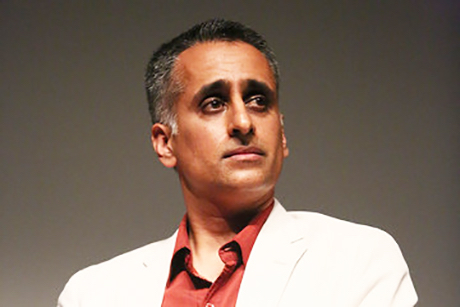RUNNING TOWARD ENLIGHTENMENT
Sanjay Rawal’s documentary on grueling race reflects deeper issues

Sounding as much like a philosopher as a filmmaker, Sanjay Rawal intones that “running reduces you to your feet and your breathing.” The documentarian is also a book editor, activist and, unsurprisingly, a runner. “Running becomes a deep, meaningful experience,” he says.
Rawal’s latest film project, 3100: Run and Become, is a synthesis of many of his beliefs—spiritual enlightenment, racial diversity, health-consciousness. The film documents the lives and efforts of participants in New York’s Self-Transcendence 3,100 Mile race, the longest certified road race in the world.
CHECK OUT MY REVIEW OF 3100: RUN AND BECOME
It’s a grueling race: the runners must run 60 miles a day, for as long as 52 days, around a half-mile loop in New York, totaling 3,100 miles. They don’t take up the challenge for bragging rights or trophies. “People do it for the best reasons,” Rawal says. “I wanted to explore it.”
Indeed, in watching Run and Become, we see the race promoted as one that leaves its participants “changed.” One of the documentary’s subjects, Finnish runner Ashprihanal Aalto, states his goal as using the race to become a better person.
It’s not unlike the way Rawal has used his career and geography to become a better person. Growing up in Oakland, Calif., the Indian-American son of a tomato breeder, Rawal was introduced to the agricultural industry. It informed his award-winning 2014 documentary Food Chains. Despite living in Oakland, Rawal has spent the last 20 years in Queens. He has a strong tie to the New York City borough’s multiethnicity.
“Queens exemplifies ‘oneness.’ It is recognized as one of the most diverse places, with 170 languages are spoken here,” he says. “There’s a wide variety of the human spirit.”
A critical documentary that shaped him as a director is 2008’s Pray the Devil Back to Hell. The film features Liberian peace activist Leymah Gbowee, who along with Ellen Johnson Sirleaf and Tawakkul Karman, received the 2011 Nobel Peace Prize for their efforts to improve women’s rights.
“The film showed me that documentaries can have deep impact,” he recalls.
But it was an interest in famed Indian spiritualist and runner Sri Chinmoy that truly inspired Rawal to make the transfer from California to New York. The late Chimney founded the race, in its 20th year at the time of the filming. Chinmoy himself had been a weightlifter and runner. His mind-body philosophical outlook inspired Rawal to tap into his own sense of spirituality, community, health and competitiveness. During his career he’s worked with not only Chinmoy (on a book and a film), but with South African theologian and activist Desmond Tutu. Rawal himself has a background in human rights activism, including women’s issues, where he served on the first men’s committee for V-Day. Rawal was even a semi-competitive runner.
“What was my place in world? I found that through Sri,” he says. “But it wasn’t until this film that I truly focused on physically understanding the human body.” When Rawal met film subject Shaun Martin, a Navajo descendant, “it really began to sink in that running is a prayer,” he says. In the film, Martin’s run across the desert is a spiritual one.
Rawal’s film takes us beyond the city blocks of the race and on a more expansive journey. The documentary—produced by Illumine Group, shot by Sean Kirby and edited by Alex Meillier—invites us to see the Great Good of running as the film reveals its impact across the globe.
In Africa, original tribes ran to hunt, in other words, they ran for their very survival. Bushmen connect hunting and running and spirituality. In Japan, Buddhist monks circle a mountain in search of enlightenment, undertaking a task not unlike the Self-Transcendence runners. Miles and miles of movement and prayer, totaling a seven-year challenge for the monks. On an Arizona reservation, a Navajo descendant undertakes a ceremonial run to his family’s ancestral home 110 miles away. We see a link between running and spiritually as the man prays for strength and guidance before he proceeds.
Despite a strong spiritual subtext beneath the race narrative, Rawal doesn’t see Run and Become as a message film. It’s not the traditional “talking head” interview type of work, he says. “I see it as more of an art film about running.”
| Marvin Brown’s Movie Review Archive
Social tagging: 3100: Run and Become > Desmond Tutu > director interview > documentary > Ellen Johnson Sirleaf > Indian-American > Leymah Gbowee > Marvin Brown > Sanjay Racal > Tawakkul Karman




